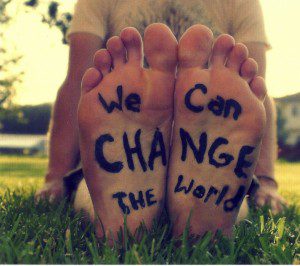By Rob Hopkins
Guest Writer for Wake Up World
Most people would agree that what we need are jobs, economic activity, stronger and happier communities and community resilience. But what kind of approach is most likely to achieve this, and what is it that we actually want to grow?
GDP (Gross Domestic Profit) is a blunt tool for measuring progress. If black ice on the M4 motorway in the UK resulted in 20 car crashes, the resultant hospitalisations, demand for new cars and associated work would add significantly to the region’s GDP.
Clearly the idea that all GDP – all growth – is a good thing is ridiculous.
Alongside economic activity, we also need to grow community, well-being and resilience (the ability of communities to respond and adapt to the unexpected). We should be wary of any approach to creating growth which imperils those things.
[pro_ad_display_adzone id=”110028″]
We derive much of our employment and turnover from small and medium-sized businesses (SMEs), accounting for around three-quarters of employment. Yet all too often, the ‘growth agenda’ actively undermines those businesses that are the very foundation of this economy. The recent Portas Review showed how just 8,000 supermarkets now account for over 97% of all UK grocery sales, a High Street massacre that Tesco’s Sir Terry Leahy recently dismissed as a “part of progress”.
The National Retail Planning Forum has found that each time a large supermarket opens, on average 276 local jobs are lost, an impact felt “up to 15km away”. A recent study by Localise West Midlands on what it calls ‘community economic development’ found:
“ … strong evidence that local economies with higher levels of SMEs and local ownership perform better in terms of employment growth (especially disadvantaged and peripheral areas), the local multiplier effect, social and eco nomic inclusion, income redistribution, health, civic engage ment and well-being than places heavily reliant on inward investment where there are fewer, larger, remotely owned employers”.
Yet large-scale growth strategies often focus on big infrastructure projects and ‘regeneration’ which displaces independent traders to replace them with glittering shopping centres identical to every other high street. In terms of meeting the needs we want growth to address, it’s a disaster.
If what we want are jobs, economic activity, stronger and happier communities and community resilience, we need to think carefully about the kind of economy, the kind of growth that will produce them. For the past 7 years I have been involved in an experiment known as Transition, or ‘Transition Towns’, which may yet turn out to be one of the South West’s most important exports.
You’ll find Transition groups in 40 countries, initiating community economic development from the local level. For example, Bath & West Community Energy, an offshoot of Transitions Bath and Corsham, recently raised over £750,000 in community shares. The Bristol Pound, “real money made for Bristol”, is now accepted in hundreds of Bristol businesses, the city’s new Mayor taking his full salary in them. In London, Brixton Energy are installing solar energy on the roofs of some of the city’s poorest housing funded by investment from local residents. As Agamemnon Otero from the project told me, “we’re not wedded to solar panels … we’re wedded to well-being”.
Transition Town Totnes (TTT), together with a coalition of local stakeholder organisations, recently produced a Local Economic Blueprint, a detailed mapping of how the community spends its money. It found Totnes spends £30 million on food every year, £22 million through just two supermarkets. Applying this approach to retro-fitting housing, energy and care for the elderly, could generate £5.5 million per year to drive local jobs and business creation. Just shifting 10% of what is spent on food, for example, would bring over £2 million into the economy.
TTT’s work has also led to:
- a community-owned energy company with over 500 members
- an annual Local Entrepreneurs’ Forum supporting new enterprises
- Transition Streets, a street-by-street programme helping over 700 households reduce their energy bills by, on average, £600 per year each
- Transition Homes, set to build 25 affordable ecological homes
- The Atmos Project, close to master-planning the former Dairy Crest site as the UK’s first Community Right to Build Order.
TTT is beginning to join the dots and offer a new approach to economic development. In the face of recession, it is clear that there is no cavalry coming riding to our community’s rescue, that we are that cavalry. We can either support enterprises that underpin and build community resilience, or undermine them. As the economic crisis worsens and questions about the economic implications of our fossil fuel dependency grow, this shift in thinking could well turn out to be the spark for the creative thinking that will create an economy fit for the many uncertainties of the 21st century.
Communities with strong social networks of neighbours and friends are more creative, benefit from their own strengths and efforts and enjoy a better quality of life. By involving all sectors of the community, Transition believes that we can produce innovative, effective ideas and practical skills to carry us through the transition to a much more rewarding, secure, enjoyable low carbon future.
Globally, nationally and as a local community we are entering previously unchartered territory. The pressures on our society in 2030 will require communities to be much more self-sustaining. And we have a choice – we can wait and have those changes imposed on us, or we can create the future vision we want to see with the development of vibrant and resilient local communities.
The Transition Initiatives engages residents, schools, businesses, entrepreneurs, investors, in social and enjoyable local visioning activities. By building a 2030 vision it helps us to plan how we are going to get there and the projects and activities we would need to undertake to make the changes we need to make. People of all walks of life with a whole range of skills and experiences get involved at whatever level and on an issue that interests them – whether it be arts, building and housing, economies and livelihoods, energy, food, education, heart and soul, local government liaison, outreach, transport, Transition tales, or even leadership and team building.
If you want to get involved:
- Buy the book
- Share your ideas with friends
- Find the resources and advice you need
- Visit Transitionnetwork.org
Local action CAN change the world.
Recommended reading from Rob Hopkins:
- The Power of Just Doing Stuff: How Local Action Can Change the World – by Rob Hopkins (Jun 4, 2013)
- The Transition Companion: Making Your Community More Resilient in Uncertain Times – by Rob Hopkins (Nov 3, 2011)
- Transition in Action: Totnes and District 2030, An Energy Descent Action Plan – by Jacqi Hodgson and Rob Hopkins (Oct 22, 2010)
- Local Food: How to Make it Happen in Your Community (Transition Guides) – by Tamzin Pinkerton and Rob Hopkins (Sep 14, 2009)
- The Transition Handbook: From Oil Dependency to Local Resilience – by Rob Hopkins (Aug 10, 2008)
About the author:
Rob Hopkins is co-founder of Transition Town Totnes and the Transition Network, organisations dedicated to creating a future where local economies are valued and nurtured; where lower energy use is seen as a benefit; and where enterprise, creativity, and the building of resilience are cornerstones of a new economy.
Rob is author of the best-seller The Transition Handbook and The Transition Companion: Making Your Community More Resilient in Uncertain Times and has just released his latest book The Power of Just Doing Stuff: How Local Action Can Change the World, a collection of inspiring stories of people all across the world who are already doing amazing and creative things to change their communities – and the world – for the better.
Check out Rob’s blog on www.transitionnetwork.org and follow him on Twitter.
[pro_ad_display_adzone id=”110027″]







